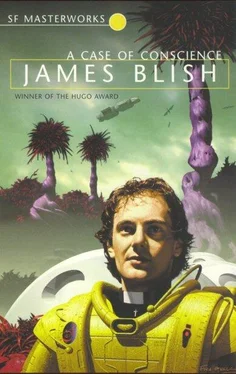No, that must not be. Lithia as a rigged Garden had been dangerous enough; but Lithia transformed into a planet-wide fortress of Dis was a threat to Heaven itself.
The Count d’Averoigne’s main observatory had been built by the UN, to his specifications, approximately in the center of the crater Stadius, a once towering cup which early in its history had been swamped and partially melted in the outpouring sea of lava which made the Mare-Imbrium. What remained of its walls served the count’s staff as a meteor—rampart during showers, yet they were low enough to be well below the horizon from the center of the crater, giving the count what was effectively a level plain in all directions. He looked no different than he had when they had first met, except that he was wearing brown coveralls instead of a brown suit, but he seemed glad to see them. Ruiz-Sanchez suspected that he was sometimes lonely, or perhaps lonely all the time—not only because of his current isolation on the Moon, but in his continuing remoteness from his family and indeed the whole of ordinary humanity.
“I have a surprise for you,” he told them. “We’ve just completed the new telescope—six hundred feet in diameter, all of sodium foil, perched on top of Mount Piton a few hundred miles north of here. The relay cables were brought through to Stadius yesterday, and I was up all night testing my circuits. They have been made a little neater since you last saw them.” This was an understatement. The breadboard rigs had vanished entirely; the object the count was indicating now was nothing but a black enamel box about the size of a tape recorder, and with only about that many knobs.
“Of course to do this is simpler than picking up a broadcast from a transmitter that doesn’t have CirCon, like the Tree,” the count admitted. “But the results are just as gratifying. Regard.” He snapped a switch dramatically. On a large screen on the opposite wall of the dark observatory chamber, a cloud-wrapped planet swam placidly.
“My God!” Michelis said in a choked voice. “That’s—is that Lithia, Count d’Averoigne? I’d swear it is.”
“Please,” the count said. “Here I’m Dr. Petard. But yes, that’s Lithia; its sun is visible from the Moon a little over twelve days of the month. It’s fifty light-years away, but here we see it at an apparent distance of a quarter of a million miles, give or take ten thousand—about the distance of the Moon from the Earth. It’s remarkable how much light you can gather with a six-hundred-foot paraboloid of sodium when there’s no atmosphere in the way. Of course with an atmosphere we couldn’t maintain the foil, either—the gravity here is almost too much for it.”
“It’s stunning,” Liu murmured.
“That’s only the beginning, Dr. Meid. We have spanned not only the space, but also the time—both together, as is only appropriate. What we are seeing is Lithia today—right now, in fact—not Lithia fifty years ago.”
“Congratulations,” Michelis said, his voice hushed. “Of course the scholium was the real achievement—but you threw up an installation in record time, too, it seems to me.”
“It seems that way to me, too,” the count said, taking his cigar out of his mouth and regarding it complacently. “Are we going to be able to catch the ship’s landing?” the UN man said intensely.
“No, I’m afraid not, unless I have my dates wrong. According to the schedule you gave me, the landing was supposed to have taken place yesterday, and I can’t back my device up and down the time spectrum. The equations nail it to simultaneity, and simultaniety is what I get—neither more, nor less.”
His voice changed color suddenly. The change transformed him from a fat man delighted with a new toy into the philosopher-mathematician Henri Petard as no disclaimer of his hereditary title could ever have done.
“I invited you to hold your conference here,” he said, “because I thought you should all be witnesses to an event which I hope profoundly is not going to happen. I will explain:
“Recently I was asked to check the reasoning on which Dr. Cleaver based the experiment he has programmed for today. Briefly, the experiment is an attempt to store the total output of a Nernst generator for a period of about ninety seconds, through a special adaptation of what is called the pinch effect.
“I found the reasoning faulty—not obviously, Dr. Cleaver is too careful a craftsman for that, but seriously, all the same. Since lithium 6 is ubiquitous on that planet, any failure would be totally disastrous. I sent Dr. Cleaver an urgent message on the CirCon, to be tape-recorded on the ship that landed yesterday; I would have used the Tree, but of course that has been cut down, and I doubt that he would have accepted any such message from a Lithian had it not been. The captain of the ship promised me that the tape would be delivered to Dr. Cleaver before any of the remaining apparatus was unloaded. But I know Dr. Cleaver. He is bullheaded. Is that not so?”
“Yes,” Michelis said. “God knows that’s so.”
“Well, we are ready,” Dr. Petard said. “As ready as we can be. I have instruments to record the event. Let us pray that I won’t need them.”
The count was a lapsed Catholic; his injunction was a habit. But Ruiz-Sanchez could no more pray for any such thing than the count could—and no more could he leave the outcome to chance. St. Michael’s sword had been put into his hand now so unmistakably that even a fool could not fail to recognize it. The Holy Father had known it would be so, and had planned for it with the skill of a Disraeli. Ruiz-Sanchez shuddered to think what a less politically minded Pope would have made of such an opportunity, but of course it had been God’s will that this should happen in the time of Hadrian and not during any other pontificate. By specifically ruling out any formal excommunication, Hadrian had reserved to Ruiz-Sanchez’ use the one gift of grace which was pertinent to the occasion at hand. And perhaps he had seen, too, that the time Ruiz-Sanchez had devoted to the elaborate, capriciously hypercomplex case of conscience in the Joyce novel had been time wasted; there was a much simpler case, one of the classical situations, which applied if Ruiz-Sanchez could only see it. It was the case of the sick child, for whose recovery prayers were offered.
These days, most sick children recovered in a day or so, after a shot of spectrosigmin or some similar drug, even from the brink of the terminal coma. Question: Has prayer failed, and temporal science wrought the recovery?
Answer; No, for prayer is always answered, and no man may choose for God the means He uses to answer it. Surely a miracle like a life-saving antibiotic is not unworthy of the bounty of God.
And this, too, was the answer to the riddle of the Great Nothing. The Adversary is not creative, except in the sense that He always seeks evil, and always does good. He cannot claim any of the credit for temporal science, nor imply truthfully that a success for temporal science is a failure, for prayer. In this as in all other matters, He is compelled to lie.
And there on Lithia was Cleaver, agent of the Great Nothing, foredoomed to failure, the very task to which he was putting his hand in the Adversary’s service tottering on the edge of undoing all His work. The staff of Tannhauser had blossomed: These fruits are shaken from the wrath-bearing tree.
Yet even as Ruiz-Sanchez rose, the searing words of Pope Gregory VIII trembling on his lips, he hesitated still again. What if he were wrong after all? Suppose, just suppose, that Lithia were Eden, and that the Earth-bred Lithian who had just returned there were the Serpent foreordained for it? Suppose it always happened that way, world without end?
Читать дальше











